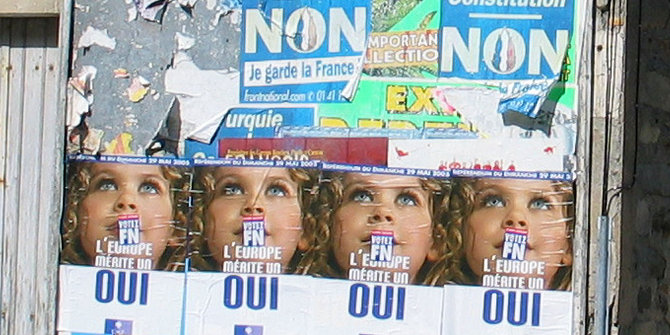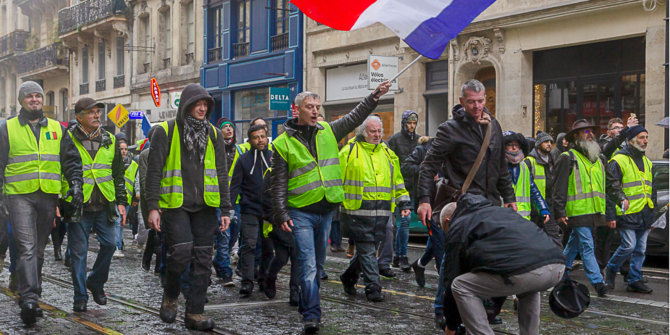The French presidential election has already produced high drama, with Emmanuel Macron and Marine Le Pen ultimately advancing to the second round on 7 May. But were their parallels with the first round of voting and developments in other European countries? Caterina Froio draws together three key ways in which the election has reflected Western European trends, but argues that Macron’s ability to successfully oppose the establishment from within stands out as unique in the European context.
After a long campaign characterised by security alerts, corruption scandals and contested primary consultations, Emmanuel Macron and Marine Le Pen emerged as the top two candidates in the first round of the French presidential election, with 77.8% of the electorate turning out to vote, slightly less than in 2012 when 78.5% cast their vote. In contrast to the unsuccessful predictions that occurred during the Brexit referendum and US presidential election, the polls were proven accurate. Macron and Le Pen lived up to expectations and advanced to the second round, due to take place on 7 May.
While it may be too early to draw concrete implications from the result, it is still possible to highlight some major trends and set the first round within the broader Western European context. Indeed, the result reflected Western European trends in at least three different ways.
- The decline of mainstream parties
First, voters in several European countries have withdrawn support from mainstream parties, and particularly from those on the centre-left. While disenchantment with mainstream parties in Europe has been mounting for years, with France representing no exception, the results of the first round were striking in denying both mainstream parties access to the second round. This is even more remarkable if we consider that, in the six presidential elections between 1981 and 2012, the two main parties won an average of 49% of the votes at the first round. However, the mainstream candidates this time around, François Fillon and Benoît Hamon, obtained only 26.3% combined. This represented a major loss of support for the two main parties in the French party system.
Table: Result of the first round of the French presidential election

Source: Ministry of Internal Affairs
Fillon lost around 2.5 million of the votes obtained by his predecessor Nicolas Sarkozy in 2012, with the Republicans now ranking third on 20%. The electoral sanction was even harsher on the incumbent Socialist Party, represented by Hamon, who ranked fifth with only 6.4%, marking a loss of about 8 million votes from François Hollande in 2012. While more detailed data will emerge on who benefited most from these shifts, the historic defeat of the Socialist Party follows the example set by social-democratic parties elsewhere in Europe, including Greece, Spain, and the Netherlands.
- The rise of parties at the extremes
Second, parties located at the extremes of the political spectrum increased their scores the most. On the one hand, in line with the rise of Syriza in Greece and Podemos in Spain, the radical left-wing candidate Jean-Luc Mélenchon (Unsubmissive France, LFI) increased his previous electoral score by over 3 million votes. On the other, similar to Geert Wilders’ PVV in March, and to Norbert Hofer’s FPO in May 2016, the radical right Front National increased its support by more than one million votes when compared to the first campaign run by Marine Le Pen in 2012.
More data on the local distribution of the FN’s and LFI’s votes are needed to understand the geographic distribution and sociodemographic profiles of these new voters. Both Le Pen and Mélenchon are generally understood as populist leaders. Indeed, they both campaigned in the name of the ‘pure people’, and against ‘corrupt elites’, in isolation from all other mainstream actors. Yet, they exhibit two strikingly different understandings of who ‘the people’ they stand for are.
Commentators too often indulge in overly simplistic interpretations, according to which electorates could easily swing across anti-establishment parties: interpretations which lead to the alarmist conclusion that ‘populism’ is taking over France, or even Europe. While sharing similar anti-establishment rhetoric, Le Pen and Mélenchon display alternative configurations of ‘the people’, which correspond to their respective location at the far right, and far left ends of the political spectrum. While Marine Le Pen builds on French nationalism and defines ‘the people’ exclusively in ethnic/cultural terms, Mélenchon defends a ‘we are the 99%’ interpretation of the national community. Interpreting the phenomenon of populism in its complexity is much more than a simple academic exercise in definition. Indeed, it is absolutely crucial to understand why, despite Mélenchon’s refusal to endorse Macron, it is very unlikely that the votes of the LFI will simply be transferred to Marine Le Pen’s FN.
- The politicisation of European issues
The third point has to do with the role played by European issues in the campaign, i.e. the politicisation of Europe. If electoral campaigning on the EU has surfaced across Europe only recently, the effects of the euro crisis, and the echoes of Brexit have further intensified the relative importance of EU issues within the agendas of the French presidential candidates. Most strikingly, Europe represents a crucial dimension of conflict for both Macron and Le Pen in the second round. In fact, by looking carefully at their electoral programmes, one can see that the EU represents the only subject which is recognised as a relevant issue by both actors, signifying that it is a topic on which the two candidates are likely to enter into direct conflict.
Like most other radical right populist parties in Europe, the FN does not consider the economy a primary concern, as opposed to Macron, whose platform was almost exclusively grounded on proposals for social and economic reforms in France. Macron, in fact, follows the example of previous centrist leaders in Europe who purposely (and strategically) avoid paying much attention to immigration and identity issues, so as not to alienate potential supporters over cultural issues.
Thus, the programmes of the two candidates only ‘meet’ at the crossroads between the cultural and the economic dimension: Europe. On the one hand, Macron unconditionally supports the EU, calling for an acceleration of the process of EU integration, and for the relaunching of the Eurozone and the common market. On the other hand, Marine Le Pen, who originally hoped to capitalise on the consequences of the euro-crisis to bring about the exit of France from the Eurozone, eventually opted to campaign on a referendum on EU membership, following the British example.
This articulation of political conflict over the EU, however, indicates that the two camps still lack the capacity to organise opposition within the European polity in the sense understood by Peter Mair. This means that candidates do not engage with one another on European affairs, but either display a principled opposition to the EU, or seek the exclusion of their political opponent, at least from this type of public debate. Accordingly, while the Front National defends a principled nativist opposition to the EU polity in its very essence, En Marche offers a rather tentative critique of the workings of democracy within the EU, and of the technocratic model of EU governance that has bred Euroscepticism over the past decade.
Is Macron different?
Hence, the French elections have much in common with national elections that have taken place elsewhere in Europe in recent years. A crucial specificity of the French scenario, however, concerns the political context that allowed for the success of Emmanuel Macron, at least in the first round. Unlike other European countries where mainstream parties lost consensus to the advantage of overtly anti-establishment ones, the French political system managed to generate a mainstream alternative from within.
In a number of European countries, a political crisis facilitated the establishment of technocratic governments that had never been directly appointed via elections. This, in turn, triggered discontent with incumbent parties, nourishing those electoral challengers emerging from grassroots politics and opposing the political and economic establishment, as in the case of Syriza in Greece, Podemos in Spain, and the Five Star Movement in Italy.
The specificity of the French case, thus, is that the demise of mainstream parties produced the emergence of a technocratic candidate. In this respect, Macron was particularly successful in diverting attention from his role within the incumbent government, where he was Assistant General Secretary of the French President, and Minister of Finance from 2014 to 2016. He effectively presented himself as an ‘alternative’ to the system, even though his profile is undoubtedly much closer to the upper end of the elite/people divide characterising contemporary European politics.
There are no laws in politics, but the circumstances outlined above seem to suggest that there will be little space for partisanship in the upcoming second-round campaign. So far, Macron’s strategy has been that of downplaying partisanship, to promote the innovativeness of his political message, and to attract voters disillusioned with mainstream parties. At the same time, the strong cordon sanitaire that French parties apply to marginalise the Front National is producing a cross-party consensus for Macron and against Le Pen.
This renewed French republicanism, which is only kept together by opposition to the FN, configures a new form of bi-polarism, in which the FN is alternately opposed to the centre-left, the centre-right, or different combinations of the two. Inevitably, this is likely to provide further leverage to Marine Le Pen’s argument that the FN is the only ‘alternative’ to the system. And ultimately, keeping the FN out of power this time is only a short-term solution, the long term solution is that the political mainstream radically renew its narrative, leaders and proposals.
Please read our comments policy before commenting.
Note: This article gives the views of the author, and not the position of EUROPP – European Politics and Policy, nor of the London School of Economics.
_________________________________
 Caterina Froio – University of Oxford
Caterina Froio – University of Oxford
Caterina Froio is VOX-Pol Research Fellow at the University of Oxford, Oxford Internet Institute (UK). Since 2016, she has been a co-convener of the European Consortium of Political Research (ECPR) section on “Populism, Political Radicalism and Political Extremism” endorsed by the ECPR Standing Group “Extremism and Democracy”.





